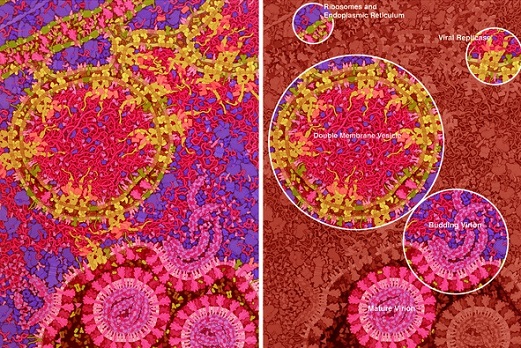Structural Proteins S, M, and E of SARS-CoV-2 Distinctly Influence Endoplasmic Reticulum Stress Responses
Nikhil Prasad Fact checked by:Thailand Medical News Team Jan 27, 2025 2 months, 4 weeks, 2 days, 23 hours, 31 minutes ago
Medical News: A groundbreaking study by researchers from the University of Liverpool-UK, University of Aljouf, Najran University-Saudi Arabia, and the Animal and Plant Health Agency (UK) sheds new light on the molecular mechanisms of SARS-CoV-2, the virus responsible for COVID-19. The study focuses on how the structural proteins of SARS-CoV-2 - namely, spike (S), membrane (M), and envelope (E) - impact cellular stress responses and immune pathways.
 Structural Proteins S, M, and E of SARS-CoV-2 Distinctly Influence Endoplasmic Reticulum Stress Responses
Structural Proteins S, M, and E of SARS-CoV-2 Distinctly Influence Endoplasmic Reticulum Stress Responses
This
Medical News report delves into the significant findings, explaining how these viral proteins influence cellular behavior and provide new insights into their role in the progression of COVID-19 and potentially other viral infections.
Key Findings on SARS CoV 2 Structural Proteins
SARS-CoV-2 has four main structural proteins: spike (S), membrane (M), envelope (E), and nucleocapsid (N). These proteins are vital for viral replication and host cell interaction. The study revealed that the S, M, and E proteins significantly alter cellular stress responses and immune signaling, while the N protein does not exhibit the same impact. This distinction highlights the unique roles of each protein in viral infection and immune modulation.
Researchers observed that the S, M, and E proteins modulate a cellular process known as endoplasmic reticulum (ER) stress. The ER is responsible for folding and assembling proteins within cells. When this process is disrupted by the accumulation of viral proteins, the cell activates a protective mechanism called the unfolded protein response (UPR). The study found that SARS-CoV-2 proteins hijack this pathway to benefit viral replication and evade immune detection.
Impacts on the NF-kB Pathway and Immune Responses
One of the study's significant findings was the effect of these proteins on the nuclear factor kappa B (NF-kB) signaling pathway, a critical regulator of immune responses. The researchers used a sophisticated experimental model involving the HIV-1 long terminal repeat (LTR) promoter to measure NF-kB activity. They discovered that the S, M, and E proteins suppress NF-kB activation, which may help the virus evade the host's immune response.
Notably, the N protein, which is synthesized in the cytoplasm rather than the ER, did not affect NF-kB signaling. This suggests that its role in the viral lifecycle is distinct from the other structural proteins.
Gene Expression Changes Induced by SARS-CoV-2 Proteins
Through advanced gene expression analysis, the study revealed that SARS-CoV-2 structural proteins trigger significant changes in the host cell's gene activity. Key findings include:
-Interferon-Stimulated Genes (ISGs): These genes, critical for antiviral defense, were upregulated in the presence of the S, M, and E proteins. The proteins activated genes such as ISG15, IFIT1,
and IFIT3, which play a role in inhibiting viral replication and enhancing immune responses.
-Heat Shock Proteins (HSPs): These molecular chaperones help protect cells from stress. The S, M, and E proteins increased the expression of HSP genes like HSPA6 and HSPH1, which may assist in viral protein folding and assembly.
-Long Non-Coding RNAs (lncRNAs): These regulatory RNA molecules were significantly downregulated by SARS-CoV-2 proteins. Notably, lncRNAs like MALAT1 and NEAT1, which are linked to immune regulation, were affected.
Implications for Understanding Viral Pathogenesis
The study's findings underscore the complexity of SARS-CoV-2's interaction with host cells. By manipulating cellular stress responses and immune signaling pathways, the virus enhances its ability to replicate and evade detection. This understanding opens new avenues for therapeutic strategies targeting these pathways to mitigate the effects of COVID-19.
Conclusions and Broader Impact
In conclusion, the research highlights the distinct roles of SARS-CoV-2 structural proteins in modulating cellular processes. The S, M, and E proteins significantly impact ER stress responses, immune signaling, and gene expression, while the N protein operates through different mechanisms. These insights contribute to a deeper understanding of the virus's pathogenicity and may inform the development of targeted treatments.
The findings emphasize the importance of studying the molecular interplay between viruses and host cells to uncover potential therapeutic targets. With continued research, scientists hope to leverage this knowledge to combat not only SARS-CoV-2 but also other viral infections that exploit similar mechanisms.
The study findings were published in the peer-reviewed International Journal of Molecular Sciences.
https://www.mdpi.com/1422-0067/26/3/1047
For the latest COVID-19 News, keep on logging to Thailand
Medical News.
Read Also:
https://www.thailandmedical.news/news/sars-cov-2-orf3a-protein-hijacks-clcc1-chloride-channel-to-cause-endoplasmic-reticulum-dysfunction
https://www.thailandmedical.news/news/university-of-california-study-finds-that-sars-cov-2-nsp4-protein-alters-endoplasmic-reticulum-structure
https://www.thailandmedical.news/news/thapsigargin-and-tunicamycin-block-sars-cov-2-cell-entry-via-differential-modulation-of-unfolded-protein-response-akt-signaling-and-apoptosis
https://www.thailandmedical.news/news/study-finds-that-sars-cov-2-orf3a-interacts-with-the-clic-like-chloride-channel-1-clcc1-and-triggers-an-unfolded-protein-response
https://www.thailandmedical.news/articles/coronavirus
